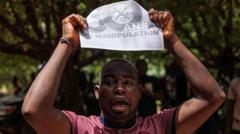The latest actions by the military authorities indicate a tightening grip on power and suppression of dissent in Mali, raising questions about the future of democracy in the country.
Mali's Military Regime Bans Political Parties as Dissent Grows

Mali's Military Regime Bans Political Parties as Dissent Grows
Mali's junta takes drastic measures against political opposition amid escalating tensions.
Mali's ruling military junta has officially disbanded all political parties in a sweeping move that underscores its ongoing campaign against dissent since coming to power. A statement broadcast on state television on Tuesday announced that "all meetings of members of political parties and organisations of a political character are dissolved across the national territory." This decision comes from military leader Assimi Goïta, who has solidified his position following coup actions in 2020 and 2021 and is slated to maintain his authority for at least the next five years, despite earlier pledges to conduct elections.
The junta's actions threaten to kindle further resistance from political factions that have been vocal in their demands for a restoration of democratic governance. In recent months, the military authorities have ramped up restrictions on political activity, culminating in a disturbing incident last week where armed men, claiming to be police officers, abducted two opposition leaders following a rare pro-democracy demonstration. The junta has not provided any updates regarding these alleged kidnappings.
Controversially, a national conference convened by the military regime—boycotted by key opposition parties—recently recommended appointing Gen Goïta as president until 2030. This proposition has drawn fierce criticism from opposition leaders and human rights organizations alike. Initially, the junta had pledged to conduct fresh elections in February 2022.
The presidential decree issued Tuesday warned citizens of the serious nature of the political party dissolution, without specifying any consequences for noncompliance. It further advised that individuals holding political or administrative positions could "continue their duties without party affiliation." The main opposition coalition has not yet publicly responded to this latest development, but coalition member Nouhoum Togo sought to minimize its impact via a social media post. "No matter how hard they try to make you invisible, your value doesn't depend on their recognition," stated Togo, who heads the Union for the Safeguarding of the Republic (USR) party.
This order follows a previous suspension of political activities, another contentious recommendation from last month's national conference, which provoked outrage among opposition figures. A coalition of nearly a hundred political parties had intended to stage a protest against the transitional government last week, only to put those plans on hold due to the crackdown on political activities.
Since seizing power, Gen Goïta has forged alliances with leaders from neighboring Burkina Faso and Niger, signaling a shift towards Russia and a marked reduction in relations with former colonial power France. Recently, Mali also withdrew from the regional economic bloc Ecowas over its insistence on reinstating democratic governance, a decision echoed by Burkina Faso and Niger.




















